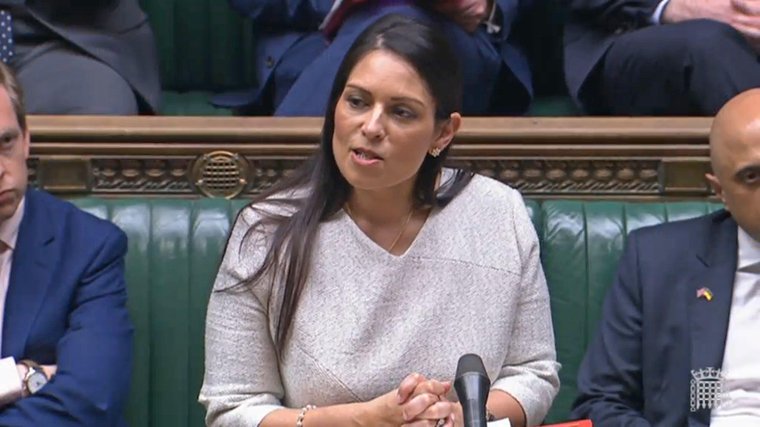Priti Patel’s new law would make it an offence for certain organisations to reveal ‘restricted’ information
UK MPs are set to debate the government’s new ‘national security’ law, which could criminalise public interest journalism while granting ministers immunity from involvement in war crimes.
Priti Patel’s National Security Bill, unveiled in the Queen’s Speech last month, would make it an offence for journalists to report ‘restricted’ official information in the public interest if they or their organisation has received funding from a foreign state.
The bill is now set to enter what is known as ‘committee stage’ and ‘report stage’ as it moves through Parliament – a chance for MPs to scrutinise it in detail and vote on changes.
Tory backbencher David Davis has already warned that media organisations such the Organised Crime and Corruption Reporting Project, and non-governmental organisations (NGOs) such as Reprieve, Transparency International and Anti-Slavery International – all of which have been given grants by overseas governments while carrying out important transparency work – could face prosecution under the new laws.

The Home Office argues that the bill, which was debated in Parliament on Tuesday, is needed because the UK’s secrecy laws are outdated and no longer counter “modern-day state threats” from countries including Russia and China. The Official Secrets Act, a series of laws governing national security and the protection of state secrets, was last updated in 1989.
But critics say the laws are too broad and risk criminalising the act of challenging the government. The proposals come after just weeks after the government’s recently passed Police, Crime, Sentencing and Court Bill, which has been widely criticised for cracking down on protest, and an Elections Bill that civil rights groups say undermines the independence of the UK’s elections watchdog.
These are the most contentious proposals.
Criminalise whistleblowers and civil society organisations
Any individual or organisation that receives funding from a foreign government, including the UK’s allies, could be considered as acting for or on behalf of that government under the new laws.
Civil rights groups have warned that journalists and activists who share leaks of official information to oppose government policies could face imprisonment under the National Security Bill if they belong to organisations that have been given grants by other countries.
The Campaign for Freedom of Information and human rights charity Article 19 said that the changes were “oppressive and disproportionate”.
“If the government decided that the UK’s energy situation required an immediate expansion of fracking or the building of coal fired or nuclear power plants, the use of leaked information which could undermine that policy could be a criminal offence under the bill,” they said in a briefing to MPs.
Protect, the UK’s leading whistleblower charity, has also criticised the bill for failing to safeguard whistleblowing.
“The offences are so widely drawn that our fear is that whistleblowers who reveal a trade secret while raising concerns about fraud or corruption to foreign regulator or law enforcement such as the FBI or to a foreign-owned media outlet could be committing a criminal offence that carries a sentence of life in prison,” said Andrew Pepper-Parsons, the organisation’s head of policy.
The government ignored a recommendation by the Law Commission to include a public interest defence in the bill, which would allow campaigners and journalists to challenge offences for sharing leaks.
Widens the definition of what information is illegal to share
The sharing of certain confidential official information is already a criminal offence under the Official Secrets Act 1989 – but only if the data relates to security and intelligence, defence or international relations.
The National Security Bill removes these limits. It would make the sharing of any official information for or on behalf of a foreign power (a definition that includes working for an organisation that has received funding from overseas governments) an offence if it is restricted in any way “for the purpose of protecting the safety or interests of the UK”.
This is a bit of a mouthful – but what it potentially means is that if a media organisation or NGO has ever received funding from a non-UK government, then it cannot share any information that the government hasn’t actively disclosed. Finding and reporting official information that is ‘restricted’ in some way is more commonly known as journalism.
The Campaign for Freedom of Information and Article 19 both argue that this law could also be applied to any information that the government has refused to disclose via a Freedom of Information (FOI) request, as that refusal would constitute a restriction. The government’s record on disclosing information through FOI has been abysmal.
Allow ministers to decide what information is legal or illegal to share
The bill would make sharing official information an offence when it is used in a way that is prejudicial to the UK’s “safety or interest”.
In the bill’s explanatory notes, even the government admits that this term is “not defined” – but argues that case law has set a precedent for ministers to determine what is the safety or interest of the UK.
The bill sets no limits to what could be considered “an interest” – only that ministers would get the final say.
Grant ministers and spies immunity from assisting in overseas crimes
While making it harder for journalists to reveal ministers’ wrongdoing, the bill also perversely grants immunity to ministers or spies who assist in overseas crimes.
The Serious Crime Act, which was passed in 2007, made it an offence to do anything in the UK encouraging or assisting a crime overseas. But the Home Office is proposing an exemption if that assistance was “necessary for the proper exercise of any function” of the armed forces or UK intelligence services.
Reprieve, an international human rights organisation, said it would mean officials who provide information to foreign partners leading to someone being tortured or unlawfully killed in a drone strike, for instance, would be shielded from prosecution.
The charity also raised concerns that victims of those crimes could be prevented from seeking justice in court.
The senior Tory MP David Davis has come out against the clause, warning in the Guardian that it could “let ministers off the hook if they authorised crimes like murder and torture from the safety of their desks in Whitehall”.
Restricts legal aid for people who have been convicted of terrorism offences
Human rights organisations have raised concerns that the bill will unnecessarily limit access to justice by restricting legal aid for individuals previously convicted of terrorism offences – legislation that has been applied to peaceful protesters.
Jacob Smith, a legal expert at Rights and Security International, said the legislation would “punish an individual twice for the same conduct” by making it harder for them to challenge mistreatment by the government.
The bill would also allow the government to reduce the amount of damages an individual with a terror conviction can receive, even if they win their case.
Smith said that the proposal was particularly concerning given the recent misapplication of terrorism legislation.
In 2019, the UK was criticised by the United Nations for using anti-terror and security legislation to prosecute a group of peaceful protests who prevented a deportation flight from taking off at an airport.
The so-called Stansted 15 were given suspended sentences before their convictions were later quashed on appeal.
Original source of article: www.opendemocracy.net/en
